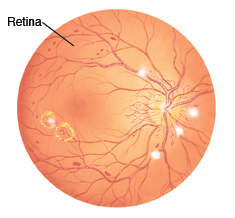The retina is the light-sensitive part of the eye that lets you see. High blood sugar can damage blood vessels of the retina and cause them to leak or bleed. This damage can lead to abnormal blood vessel growth. This condition is called diabetic retinopathy. You may not have symptoms early in the disease. Later, you may have floaters, blurred vision, or poor night vision. You may also have partial or complete loss of vision.
Early cases of diabetic retinopathy can be treated by carefully controlling blood sugar, blood pressure, and cholesterol. Surgery or laser treatments may help restore lost vision. Laser surgery can shrink abnormal blood vessels or close ones that are leaking. Medicines injected in the eye or laser treatments can help ease swelling of the retina.
Home care
-
Take all medicines, such as insulin or oral diabetes medicine exactly as prescribed.
-
Follow the diet advised by your healthcare provider. If you have high cholesterol, follow a low-fat, low-cholesterol diet.
-
Check blood sugars as advised.
-
Try to reach your ideal weight.
-
If you smoke, quit smoking. Tobacco use makes the effect of diabetes on your blood vessels worse.
-
If you have high blood pressure, consider buying an automatic blood pressure machine. These are available at most drugstores. Use this to keep track of your blood pressure. Report your blood pressure readings to your healthcare provider.
-
Exercise regularly with low-impact activities, such as walking, cycling, or water exercise. If you already have advanced retinopathy, don't do exercises that cause sudden rises in blood pressure. And don't do other forms of vigorous exercise. This includes exercises that involve holding your breath, lifting or straining, or high-impact moves.
Follow-up care
Follow up with your healthcare provider as advised. You must have a complete eye exam at least once a year, more often if needed. Untreated diabetic retinopathy can lead to complete loss of vision.
Occupational therapists can help you adapt to any vision loss you have. This includes learning to safely give yourself insulin.
When to get medical advice
Call your healthcare provider or get medical care right away if any of these occur.
-
Blurriness of your vision gets worse
-
Sudden flashes of light inside your eye
-
New floaters. These are small dots or strings that seem to be moving across your field of vision.
-
Eye pain, redness, or discharge from your eyelid
-
New dark spots appear in your field of vision
-
Halos around lights
-
Dimness of vision
Women who are pregnant and have type 1 or type 2 diabetes are at higher risk for retinopathy. Women with diabetes should have an eye exam before becoming pregnant, and in the first trimester of their pregnancy. They should continue to be watched every trimester and for 1 year after delivery, depending on how severe the retinopathy is.
Call 911
Call


